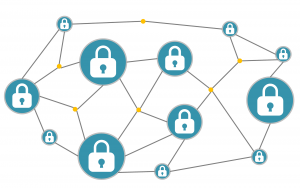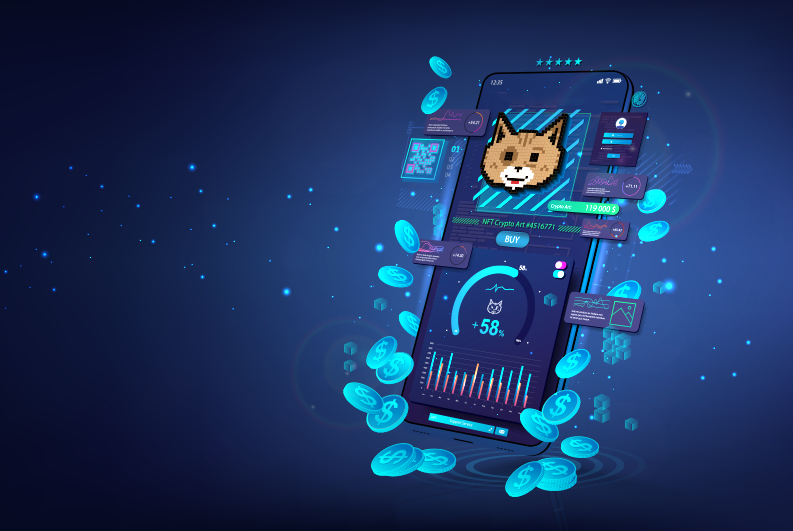Impact Of Blockchain Technology on Mobile Apps
In simple words, Blockchain technology is a decentralized database and a distributed ledger that records data that cannot be tampered with, modified, or stolen.
Blockchain erases the requirement of a central monitoring authority or server because it is basically an online record of transactions.
Let's shed some light on this technology’s influence on mobile applications.
No Central Authority Needed

Blockchain networks are decentralized IT infrastructures. You can send and receive money without a supervisor or middleman. Corporate processes driven through blockchain technology are quicker and cheaper.
Furthermore, blockchain removes bureaucracy, offers instant ledger systems, and dramatically decreases external processing charges. These enable it to facilitate effective transactions.
As per ComputerWorld, blockchain may save the biggest banks 8 to 12 billion dollars yearly. Using blockchain networks to develop smartphone apps will create a safe ecosystem for users.
And it will also decrease management and functional costs as well as produce a higher bottom line for your company. On top of that, it drives rapid and cheap worldwide data transfer.
Practically Unbreakable Security

Nowadays people carry out most daily tasks with the help of their smartphones and tablets. Therefore, app developers are highly concerned about security within mobile applications.
Cyber attacks still occur continuously all over the world and cyber security measures are pricey. Incorporating blockchain technology in mobile apps will strengthen cyber protection and information privacy.
Blockchain infrastructure uses impenetrable data encryption methods for online data transactions. This prevents hackers from manipulating information.
Moreover, it almost solves the issues related to security risks and patches linked with unreliable third parties. State-developed citizen utility applications often keep private information such as social insurance numbers and birth certificates.
Blockchain applications will save this data onto decentralized ledgers which will effectively and drastically decrease identity theft crimes and other kinds of digital scams.
Increased Transparency

Transparent transactions are essential for business practices. The kinds of mobile apps that need more transparent interactions are leveraging blockchain environments.
Blockchain provides network participants more authority over data and they can easily view who modifies a specific piece of data and when. Thus, it makes app development faster and more agile thereby, resulting in highly productive apps.
In addition to that, blockchain app developers can easily scale their apps for more users which ensures a safe, transparent, and more dynamic digital ecosystem. Even when the app requires to be updated with extra features.
Blockchain saves a company money and time, thanks to its special capability to create transparent processes and legitimacy. Also, it can help industries such as finance, healthcare, supply chain management, and logistics to get rid of the common transparency issues they face.
Data Access Made Easy

A Blockchain network allows information availability and protection. Companies need data availability for the growth of their businesses.
Blockchain allows developers to benefit from the digital ledger distributed across network nodes to create effective and accountable data accessibility for users. The technology makes data accessible plus secure.
If an organization loses its data due to a natural disaster or any other reason, it is a real mess. The decentralized blockchain platform guarantees that information will never be lost completely. It identically and automatically spreads all data entries across the entire blockchain system of app users or participants.
Enhanced Business Efficiency
We have discussed in previous sections that blockchain applications provide cheap, trustworthy, and smart app solutions to companies. But, blockchain can also enhance the overall productivity and effectiveness of business processes by easily automating pricey and time-consuming manual tasks.
The app products that run on blockchain networks can positively impact industries like property businesses, monetary institutions, logistics, music licensing, and others. The blockchain-driven apps are perfect for corporate ecosystems and markets with ever-evolving requirements and tough clients who ask for 24/7 operation.
Let's take an example of banking applications. They usually aim to execute business functions, monitor transactions, and optimize the consumer experience.
Blockchain app developers noticed that money transfer was a time-consuming process due to the many authentication and safety steps that are normally required.
So, they started creating banking apps by integrating blockchain technology in it. These apps can essentially automate and streamline a long array of validation processes.
Plus, they can furnish quicker and more secure consumer service along with decreasing or removing management time and charges.
Conclusion
Ever since blockchain technology emerged, it has been succeeding in the optimization of companies’ operations across a wide range of industries. The technology is well-hyped but its use in mobile app development is still a pristine topic.
Many businesses have widely adopted the blockchain to guarantee a trusted environment, allow secure access to information and offer safe and transparent payment transfers. Blockchain-powered apps are ideal for industries where there is zero trust between participants.








